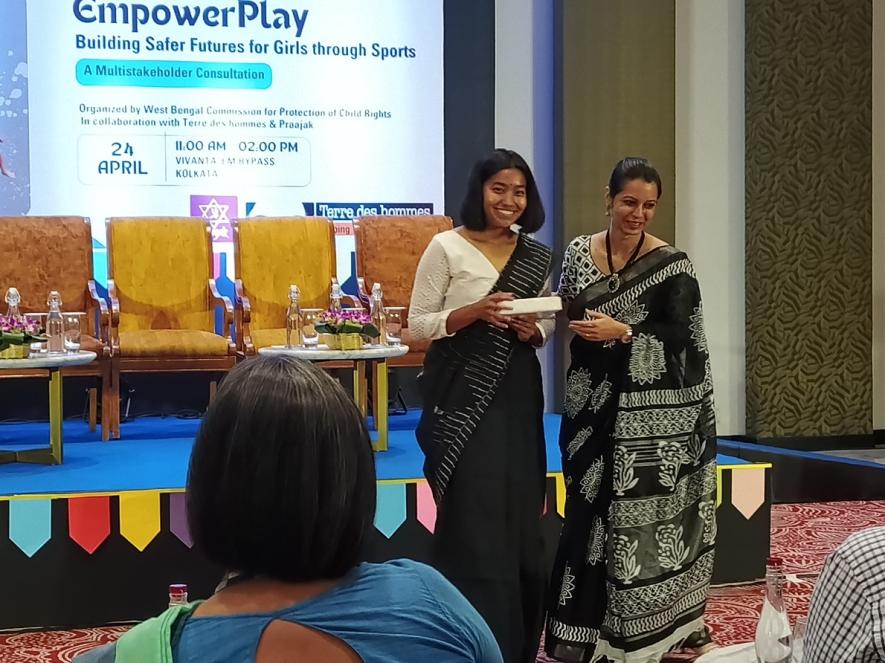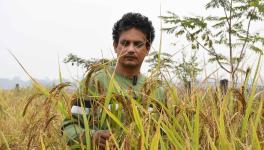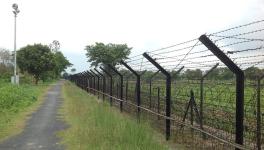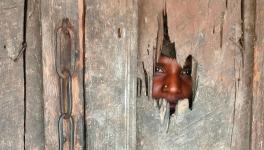Bengal: Project Helps ‘Change the Life of Girls’ Through Indigenous Sports

Programme on sports empowering the life of girls in West Bengal held in Kolkata.
Kolkata: “In the face of all hardships, the game of kabaddi is a link to our happiness”, said Sahana Banu, 18 (name changed) from Malda district, who said she faced hardship as moulvis (clerics) of local masjids gave a fatwa that women from the Muslim community cannot play kabaddi.
Born in Malda, Nimai Sarai is now a toast of her community after she won medals in sports. Ria Parveen said she also faced obstacles and drug-related problems in the club where they used to practice sports. Apart from being a kabaddi player, now she is also an anti- drugs crusader in her area.
Another girl, Sofia Halder, 21 (name changed) of Baharampur Sahis Bazaar area, narrated how she faced a lot of problem from her peers to take up kabaddi. Wearing half-pants in her area was a ‘no no’, which she overcame with parental support. Earlier, in her school, she had faced the taboo of being a slum-dweller. But sports had been instrumental in changing her life. She is now a third-year physical education student in Baharampur College. She aspires to be a Praajak NGO educator after her education is over, to help change the life of other girl students who are married off in the teens, as is the custom amongst daily wagers in West Bengal.
These were some stories narrated at an event recently held at a city hotel, where these girls were felicitated.
Praajak and Terre des hommes, an international NGO, had conceptualised the entire project aimed at touching the lives of girls in West Bengal, in association with the West Bengal Commission for Protection of Child Rights (WBCPCR).
Speaking with NewsClick, Paulami De Sarkar, programme manager – child protection, of Terre des hommes Foundation, said the ‘Kabaddi for Empowerment’ project is just not about playing the sport. It is structured and developed based on two psychological theories.
The first is Derrick Silove’s ADAPT model, which focuses on rebuilding five core psycho-social pillars: safety, inter-personal bonds, justice, identity and roles, and existential meaning. ‘Kabaddi for Empowerment’ is designed to help youth reconnect with each of these, she added.
The second is Hobfoll’s Conservation of Resources (COR) theory, which teaches that psychological stress emerges when individuals lose—or fear losing—key internal and external resources, like self-esteem, hope, social belonging, and opportunity. “Through kabaddi, we help young people reclaim these resources, equipping them with tools to recover, grow, and lead,” she said
The programme itself is structured around building ‘ENGAGE’ life skills: communication, collaboration, emotional regulation, creative thinking, and responsibility and five psycho-social well-being pillars –"Feeling Safe, Connected, Respected, Worthy and Hopeful.” These are essential for resilience and leadership.
Importantly, Sarkar said, “this methodology includes robust monitoring tools—allowing us to measure change at the individual level. We track psycho-social outcomes, behaviour shifts, and skill development, providing a clear picture of growth over time.”
She said this project was not just about playing the game, “it’s about youth stepping into their power.”
Elaborating further, she said the participants not only develop skills—they put them into practice. By leading the Social Action Projects, they raise awareness on issues that matter to them and make meaningful contributions to their communities. “It’s here that we see the true shift—from beneficiaries to changemakers,” she added.
As per Sarkar, a critical part of this methodology is that it is measurable. “We’ve built robust monitoring tools to track change at the individual level—capturing behavioral shifts, psychosocial improvements, and life skill development over time,” she said.
She further added that the model was flexible. “Kabaddi for Empowerment can be implemented in a wide range of settings—including schools, child care institutions, community centres, and protection programmes. It adapts to the context while staying rooted in its mission: to restore dignity, nurture leadership, and support healing through connection and play.”
Sarkar emphasized that this was not just a sports programme, but a “a safe space. It’s a leadership lab. It’s a healing journey. And above all, it’s a commitment—to the belief that our youth, when supported and believed in, will lead the way forward,” adding that “Let us keep investing in methods that not only protect—but truly empower.”
Speaking at the event, Tulika Das, chiarperson, WBCPCR, extended their whole hearted support to the “innovative programme, which has brought significant changes in the life of girls in the state”. She also pleaded to the organisers for including girls with disabilities within the ambit of this programme.
Das said the commission aspired to stand beside the rights of every child in the state to make them serious contributing citizens of India. “It is guaranteed that this project will touch the lives of thousands of children in the state of West Bengal,” she added.
The event included a panel discussion moderated by Ananya Chakraborty, advisor, WBCPCR, on “Adaptation of the Interventional Model” in various contexts and building resilience of children through sports. The panelists included government representatives and those from various international and Indian NGOS as well as experts on child rights.
Get the latest reports & analysis with people's perspective on Protests, movements & deep analytical videos, discussions of the current affairs in your Telegram app. Subscribe to NewsClick's Telegram channel & get Real-Time updates on stories, as they get published on our website.























